By Rich Weil, M.Ed., CDE
Founder and Director
Transformation Weight Control
I covered the first part of the ABCs of CBT in the blog, “The ABCs of Cognitive Behavior Therapy – CBT Part 1 of 2”. In a nutshell, you start with an activating event, you then have a belief about that event (often an irrational belief), and that belief drives the emotional and behavioral consequences. So, summarizing, it’s Activating event, irrational Belief, and then emotional and/or behavioral Consequences. Most people skip over the B and get right to the emotional and behavioral consequences (e.g., the emotional consequence could be dejection or despair, and the behavior consequence could be eating to soothe the dejection/despair). Here’s an illustrated review of the ABCs of CBT.
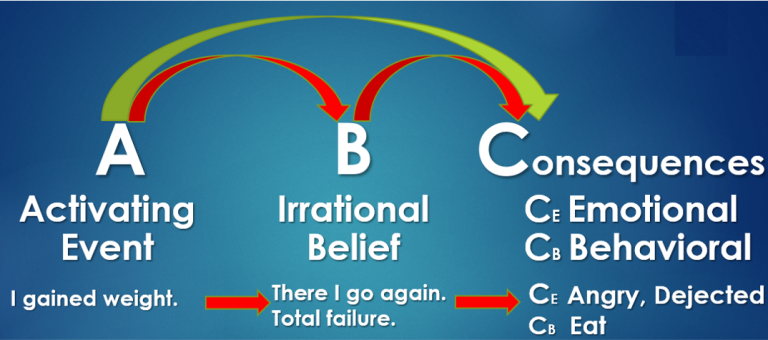
So now, let’s dive into what to do about all of this!
First, let’s define the D, E, and F.
D = Disputations
E = Effective Reframe
F = Fill the Void
If you’ve ever tried to stop someone from crying, or stop feeling bad, simply telling them to stop crying or feel better, well, good luck with that working. The fundamental approach to Cognitive Behavior Therapy is to determine the A, B, and C, because in the CBT paradigm, many humans behave the same way. That is, you experience an activating event that drives an irrational belief which causes an emotional and/or behavioral consequence. IT’S THE IRRATIONAL BELIEF THAT DRIVES THE CONSQUENCES, NOT THE ACTIVATING EVENT! You don’t skip from activating event right to emotional and behavioral consequences. It may feel that way, but it’s not what happens. Instead, there’s an irrational belief after the activating event that you may not experience or be conscious of, but it’s there, and the idea to prevent negative emotional and behavioral consequences is to identify what that irrational belief is and Dispute it (see the Disputation section below), and when you do, you can gain control over your emotional and behavioral consequence.
Here’s an illustration of an example of the DEF model.
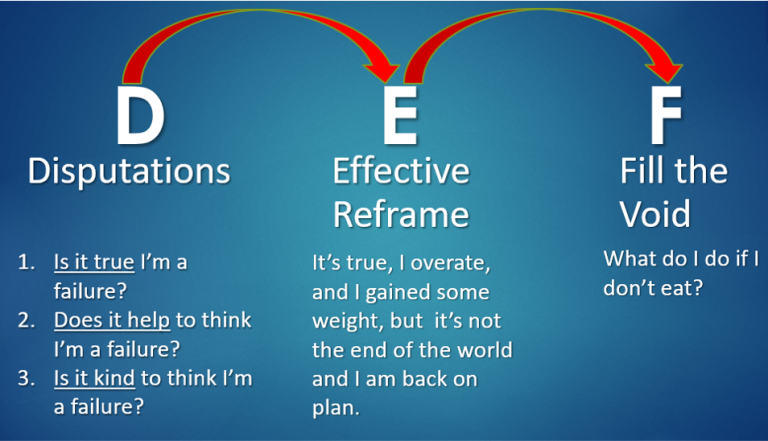
DISPUTATIONS
Think of disputations as challenging your irrational beliefs. Disputations come in many flavors. We can break them down into three types: Logical Disputes, Empirical/Reality Testing, and Pragmatic/Functional. The three main disputations we teach in our program come from just two of the three types of disputations. We use disputations from Logical Disputes and Empirical/Reality Testing. These three simple disputations pretty much cover the gamut of disputations. At the very bottom of this blog, I have included long lists of all three types of disputations. But the following three we believe are the most important. When disputing an irrational belief, ask yourself the following:
- Is my irrational belief true?
- Is my irrational belief being kind to myself?
- Is my irrational belief helping me?
In most cases, the answer is going to be “no” to all three. After all, how could an irrational belief help you in any way? Now, once you’ve disputed the irrational belief and gained control over the emotional and behavioral consequences, it’s time to effectively reframe the irrational belief. That’s the “E” in D, E, F.
EFFECTIVE REFRAME
An effective reframe is when you effectively reframe your irrational belief to something that is true, that is being kind to yourself, and is helping you. In other words, you gain control over it, and it doesn’t lead to negative emotional and behavioral consequences (the C in the ABCs). Notice that the effective reframe is opposite of the three disputations in the previous section; is it true, is it kind, is it helping?
Here’s an example. Say you step on the scale and your weight goes up after a week of staying right on plan (the activating event). Your expectation was that you would lose weight. So, then you create an irrational belief in response to the activating event by thinking or saying to yourself, “I’m a failure, I’ll never lose weight again!” Again, you may not be thinking it out loud, it could be in your subconscious, but it’s there even if you’re not aware of it. That irrational belief, conscious or subconscious, drives your negative feelings and behaviors (the consequences). But what if your disputation works, you identify your belief about the activating event as irrational, which defeats it, and now you’re left to effectively reframe the irrational thought. In our example of stepping on the scale, an effective reframe might sound like this, “It’s true, I overate, and I gained some weight, but it’s not the end of the world and I am back on plan.”
I want to take a moment to mention that it’s okay to be disappointed that your weight went up in our example, anyone would, but it’s NOT devastating. Devastating is more like when a tornado blows your house down, not that you gained one pound (just 16 ounces). Disappointment doesn’t raise your arousal as much as devastation and never lasts as long as devastation.
A Secondary Disturbance
A negative emotional or behavioral consequence as the result of an irrational belief such as devastation can be viewed as a new activating event, which starts the whole ABC cycle again, hence you end up eating again. When this happens, it’s called a “secondary disturbance”.
FILL THE VOID
Now that you’ve effectively disputed your irrational belief, stopped the negative emotional and behavioral consequences, and effectively reframed the irrational belief, what do you do now that you don’t have food to soothe your soul and calm you down? Well, you could take a bath, take a walk, read a book, watch a funny or engaging movie, knit, meditate, use an adult coloring book, or any of a hundred different options available to you. I suggest that for homework you spend some time identifying the activities that will fill your void when you don’t have food to help soothe and calm you.
So, there you have it. The full A, B, C, D, E, F, of the CBT model, presented here for your convenience one more time all in one place so that you can visually get a sense of what it looks like in totality.
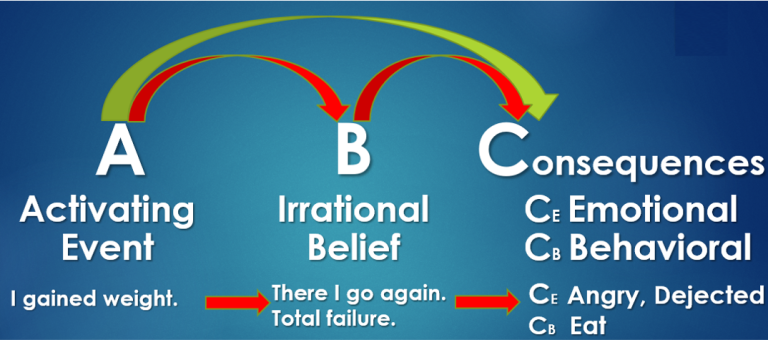
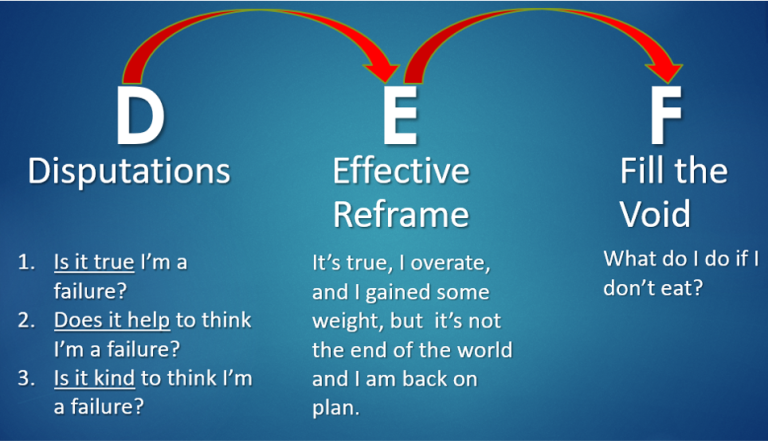
For more on this subject, I recommend reading, “A Guide To Rational Living” by psychologists Albert Ellis and Robert Harper.

And finally, I promised I’d present all the different types of disputations. So, here they are below. Just remember, in our program, we recommend the following three disputations because they cover just about all the irrational beliefs you’ll ever have.
- Is my irrational belief true?
- Is my irrational belief being kind to myself?
- Is my irrational belief helping me?
All the disputations organized by category.
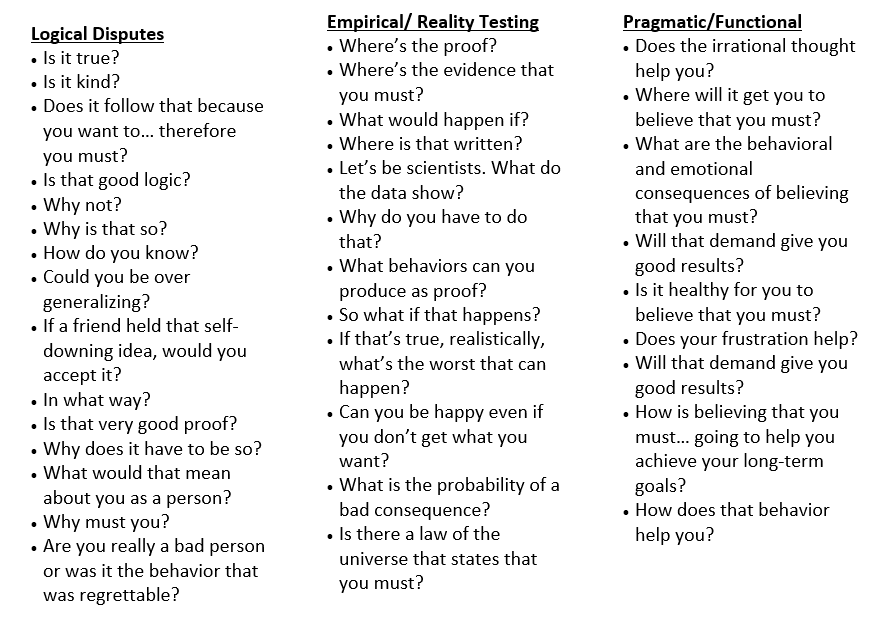
© 2025 Richard Weil, M.Ed., CDE All Rights Reserved











